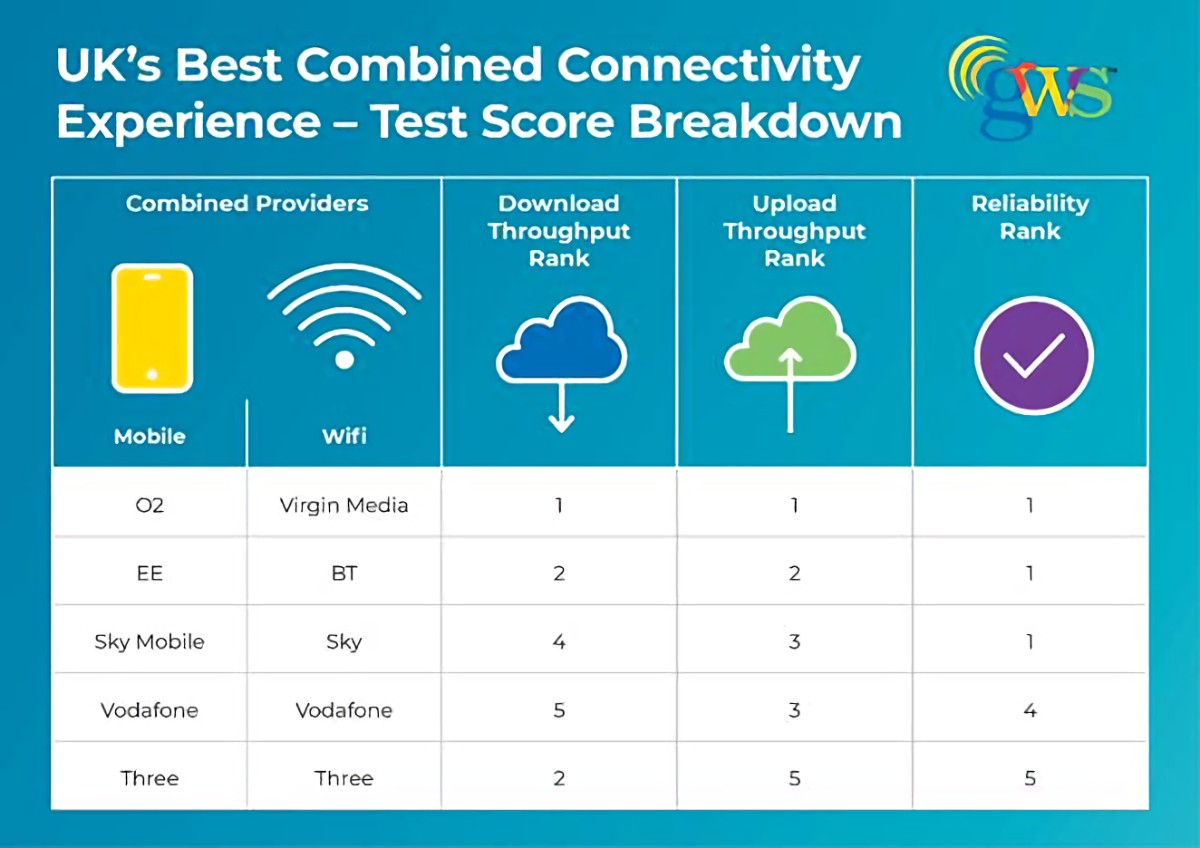GWS Name Virgin Media O2 Best Combined Mobile and WiFi Provider

Global Wireless Solutions has today published the results of a confusing new study that measured the network performance of operators that have combined their mobile and broadband ISP businesses. Overall, the study found that the fastest download speeds by a combined provider were seen by Virgin Media O2 (138Mbps average).
The data for this unusual study was collected by GWS’ opt-in consumer panel of 5,200 participants (18+) from around the UK. From this nationally representative sample of people, GWS then conducted a series of tests in the background, measuring and analysing network reliability and performance. A total of over 143,000 speed and reliability tests were run during a 6-month period (October 2022 through April 2023).
The tests were run at random times, seven days a week, and looked at reliability and performance across uploads, downloads, and video streaming on both the mobile network and “WiFi“. Only combined connectivity tests were included, meaning that only tests from a mobile network and that operator’s broadband partner were factored into reliability/performance scoring.
Advertisement
Overall, O2 and Virgin Media (VMO2) came out on top, although we only get the most basic of scoring and precious little in the way of other useful details.

Over the six months tested, the fastest download speeds by a combined provider were seen by VMO2 at 138Mbps (average), followed by BT/EE on 64Mbps. With average download speeds across all major combined providers currently sitting at 82Mbps, VMO2 was found to be the only combined provider to offer above average speeds.
When looking at uploads, VMO2 was found to lead the way at 26Mbps, followed by BT/EE at 21Mbps, then Sky Broadband / Sky Mobile (17Mbps), Vodafone (16Mbps), and Three UK (15Mbps) trailing much further behind.
Advertisement
Elsewhere, when watching videos, VMO2 also tied with Sky/Sky Mobile for the highest combined resolution and lowest buffering times. As for reliability, GWS measured whether or not simulated tasks were completed or not, and found over 96% success rate across all providers (operator and ISP) tested.
Closing Thoughts
Personally speaking, we would much rather get the separate results for each side of the network / service, not least because by combining this data the study ends up masking which aspects are causing the biggest drag on performance (e.g. O2’s mobile data speeds usually come bottom in other studies – here and here).
One other issue is that the study appeared to include Three UK, which is despite the fact that they’re a mobile-only operator (including them confuses the picture). Equally, it’s worth mentioning that the only fully converged and merged operators in the table are BT/EE and Virgin Media/O2.
Speaking of which, there’s a lack of clarity around how the “WiFi” side of broadband connections were tested. The use of WiFi terminology suggests the testing was conducted over a local wireless network, which leaves connections open to all sorts of performance issues due to the highly variable nature of wireless signals in different environments and at different distances. It’s often far better to test over a wired link.
Advertisement
Overall, without showing the full results from both sides of the network, this study is about as useful as a chocolate teapot and loses its relevance when mobile-only providers are included.
Mark is a professional technology writer, IT consultant and computer engineer from Dorset (England), he also founded ISPreview in 1999 and enjoys analysing the latest telecoms and broadband developments. Find me on X (Twitter), Mastodon, Facebook, BlueSky, Threads.net and Linkedin.
« Virgin Media O2 Highlight Next SRN 4G Mobile Upgrades in the Highlands
OneWeb LEO Satellite Test Delivers 195Mbps Broadband Speed »






















































Find out who paid for the study and you will find you it’s “usability”…
Virgin probably
Let’s make a competition we can win in!
However since O2 upgraded my local mast to 5G (NSA) I am able to get up to 120/40Mbps off peak and up to 30/20 in evening peak. Previously on 4G it wasn’t possible to get more than stable 6/2Mbps.
I would put O2 at the bottom of the pile for mobile data speed in my area. Virgin Media’s cable offering clearly helps bring up the average speeds significantly.
Agree
What’s a WiFi provider?
I have a fantastic connection and speed to my router via WiFi, but that doesn’t mean I have a great internet connection.
Agreed, weird survey.
We need proper surveys like:
Which ISP is most beloved by the nation
And Which ISP has been ranked as a National Treasure..
Click here to find out.
🙂
O2 are consistently the best in my experience in London, for COVERAGE indoors. Speeds they are middling, Vodafone and EE are usually much faster but then I have many places like pubs that have no coverage from either EE or Vodafone whereas O2 cover them with small cells so overall I stick with O2 for that reason.
Awaiting the barrage of comments
I do agree with the 02 coverage is good better than Vodafone, a few places in the Highlands I know only got coverage on 02 speed is non existent since it only 2G.
Coverage is the only slight advantage over Vodafone 02 got.
I’ve never had issues with O2’s coverage. The problem is their speeds… in some areas – even parts of London – they perform really poorly.
Since I rely more on data (whatsapp, email, social media, etc) than on traditional phone calls, this is a big problem for me.
None of this makes sense. Virgin Media are no longer a WiFi provider, and Sky/Vodafone/three have never been.
Internet and WiFi are completely different things!
Like a vacuum cleaner is now a Hoover
Internet is now WiFi
Technically completely wrong
But common language is unstoppable
What a pointless exercise and a meaningless award!
It’s a well known fact that O2 has the worst performing mobile network in the UK. What is astonishing is why Virgin Media would allow such a failing company to tarnish its image by allowing O2 to ride on their reputation for fast broadband speeds? What was Virgin Media thinking?
It’s a shame that Virgin have decided to merge with a Lemon of a company like O2!
What a crap test combine the mobile results with fixed line broadband result of the provider Virgin Media is always win since the average speed is faster than the rest of provider listed.
If it was just mobile 02 would be last in the test and EE top.
Why so much press coverage from VM02 recently? (with increasingly dubious awards for ‘best internet’)
What are they preparing for?
This survey was done in the land of make believe